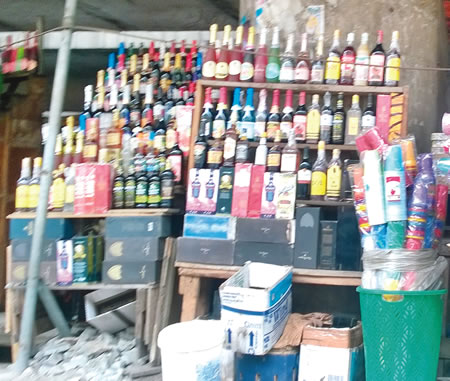Before an average unlettered person from a particular section of the country will accept a prescribed drug, he is likely to ask if the prescriber had suffered a similar ailment which the drug cured. CHUKWUMA OKPARAOCHA, SYLVESTER OKORUWA and NEWTON-RAY UKWUOMA fitted the bill for this investigative engagement.
“If it is too cheap, it is probably fake.” This is an opinion a lot of people hold dear when transacting businesses. Although, there might be little or no proof to back up this notion, simple reasoning suggests that it might have a semblance of truth to it.
In many parts of Lagos Island, especially places that could be regarded as hot spots, such as Idumota and Apongbon, two notable markets and trading zones in Lagos Island, an observer would easily see many cartons of wine, beverages and even edibles, especially packaged snacks and “quick meals” being openly displayed.
One unmistakable thing about virtually all products displayed and sold in this fashion and in the places cited is the prices at which they are sold, which are in most cases significantly cheaper than elsewhere.
For instance, in Idumota and Apongbon areas, a standard-sized box or carton of a certain popular imported “quick meal” goes for N300, as against N1600-N1700 a similar product would be bought elsewhere, including supermarkets and small stores.
Sellers of this particular product could be seen sitting or standing at roadsides displaying their wares in trays while beckoning at passersby to give their wares a try.
A similar situation now exists in the Mainland, especially in parts of Agege, where traders could also be seen selling similar items in a similar fashion.
But Apongbon, as earlier stated, is primarily known for wine and other beverages such as choice alcoholic drinks, spirits as well as notable fruit drinks and non-alcoholic wine, which are largely cherished by religious people.
All these are visibly displayed in various spots under the bridges at Apongbon and are known to be cheaper than those sold elsewhere by as much as about 40 percent.
But Saturday Tribune gathered that as “great” and “affordable” as the prices of beverages may be, quite a number of them might be products of strange contents. Saturday Tribune’s attention was first drawn to the state of wine and beverages sold at Apongbon by a recent discussion one of our correspondents witnessed between a wine dealer, whose wine shop is located at the Oshodi area of Lagos.
Oblivious of the presence of our correspondent in her shop, the middle-aged trader was heard discussing with someone on phone about how wine business had not been doing well in the last few months, a development both discussants quickly hinged on the economic recession currently being experienced in the country.
Within a few minutes, the conversation got weaved around the cheapness of beverages and wine at Apongbon and the fact that a significant number of those products were either fabricated by certain individuals inside their private houses or were simply smuggled into the country.
It was also gathered that aside from beverages that are fabricated outright by dubious traders, there are many others that have been adulterated or tampered with in one form or the other.
From the discussion, which lasted for just a few minutes, it was deduced that not only are the fake wine fabricators very good in what they do, they are also in possession of certain equipment which they expertly use to create products that will look, and sometimes even taste exactly, like the genuine ones, including equipment that help them to clamp-shut bottles, almost exactly like it is done in factories.
Past arrests made by relevant agencies could, therefore, be seen as a proof that the trader’s conversation should not be treated with kid gloves.
It will be recalled that a few years ago, the National Agency for Food and Drug Administration and Control (NAFDAC) announced the arrest of a certain individual in Idumota who specialised in producing fake products.
At the time he was arrested, fake drugs worth N19,522,500 were found in his house. Also paraded about the same time were two other suspects living on the outskirts of Lagos who were into the manufacture of fake certain whisky and wine brands. At the time of their arrests, five packets of a fabricated brand of whisky, five cartons of a wine brand and 46 bottles of a brand of whisky were recovered from their apartment.
Meanwhile, a recent trip by Saturday Tribune to parts of Apongbon suggested that, indeed, the rustic market might be the home of wine and beverages, after all, as virtually every spot underneath the Apongbon Bridge, all the way to parts of Idumota and its environs were full of diverse kinds of wine and beverages.
Although Saturday Tribune couldn’t get hold of any factory where fake wine is made, a trader at Apongbon told our correspondent in confidence that fake products could be found displayed side by side with genuine ones in the market, “just like any other market” in the country.
“You expect to find a place where wine is manufactured right here in the market? Of course, that is not possible. Those who fabricate wine and beverages cover their tracks. All the wine you find are brought from other places. You will need to travel far if you want to know where they are made”, the trader said.
When narrating his experience in a chat with Saturday Tribune, a media practitioner recalled how he filled his house with cartons of wine bought from Apongbon for a special occasion for his family. He said he was stunned when more than half of all he bought turned out to be fakes.
“Lagos is, indeed, infested with fake wine. God save Nigerians! As a result of my latest experience, I have stopped drinking wine at events. Experience has shown me that red wine is the most adulterated of all wine, because a lot of people prefer red wine to others, and the market at Apongbon is a one-stop point for all your event drinks, including red wine”, he said.
“When I did my child’s naming ceremony, all my guests refused to drink the wine I bought. I had no idea what the problem was until one of my neighbours told me that all the wine I bought were fakes”, the respondent added.
A resident who identified himself as Peter Ahaoma said he recently bought a bottle of a popular soft drink somewhere at Salolo, in the Agbado area of Lagos but a sip of the orange drink suggested that he was drinking something else.
“Immediately the content touched my taste bud, I knew something was wrong. The taste was completely different from what I knew. To prove that I was right, I asked a friend to also taste the drink and he said what was in front us wasn’t the soft drink we had in mind. Our conclusion was that the drink was nothing but a product of Apongbon”, he said.
NAFDAC speaks
The Director of Special Duties of the National Agency for Food and Drug Administration and Control (NAFDAC), Dr Abubakar Jimoh, while reacting to the proliferation of counterfeit wine in Apongbon, said the agency would swing to action to ensure that more of the unhealthy products do not get into the hands of unsuspecting Nigerians this festive season.
Calling the fight against fake wine “an ongoing battle”, he revealed that “Apongbon is, in fact, a microcosm of the larger illegal wine dealing in Nigeria. We have cracked down on many fake wine markets across the country from states such as Edo, Lagos, Jos and Kano. It is an ongoing battle.
“As we speak of fake wine made in Nigeria, there are also fake wine made and smuggled in from other countries. So, while engaging Apongbon, there is also the need to tackle wine smuggling. And the statistics we have about smuggling is mind boggling.
“As I speak, there are about 1,400 illegal routes through which things can be smuggled into Nigeria. These are distant border areas created sometimes by the smugglers themselves and from where all sorts of things can be brought into this country. There are only about 100 legal routes. Having such an enormous free terrain for smuggling, you can imagine how much activities of this sort are carried out in a day and also the enormity of the task of trying to apprehend them.
“This is the reason NAFDAC has set up a Post-Marketing Surveillance Department, which is saddled with the responsibility of ransacking the market of unregulated as well as fake products. So that even if these unhealthy products illegally scale through the borders, we can make sure they do not get into the hands of unsuspecting Nigerians.
“We are just learning about Apongbon for the first time. And I assure you that the information will be passed to the appropriate department for immediate action”, Dr Jimoh noted.
He also revealed some more staggering complexities in the fight to contain the inescapable position Nigerians stand against fake wine. Warning the general public to be cautious of the product they purchase, he disclosed that perpetrators release these products into markets in greater number during festivities such as Christmas.
“NAFDAC regulates a very wide range of products. It is sometimes tenuous to track all the activities of counterfeiters and smugglers of these products. But we have been in this since 1994. We understand the behavioural pattern of counterfeiters. For instance, we know that the rate of smuggling and counterfeiting of especially edibles increases between October and December. This is the period products such as rice, oil, meat and wine are either smuggled or counterfeited most in this country. And knowing the flashpoints, we are always on our toes, not only to arrest, but also to create awareness about these atrocities.
“I, therefore, implore our people to be cautious this festive period, and try to the source of the wine they consume.
“Information is important. We are talking to registered wine dealers and the associations in the state and local levels. They are the ones who can supply us with the needed information, since they are the competitors. We are also appealing to the custom officers to tighten the security against these unwholesome goods from passing our borders”, the NAFDAC chief added.
Extending the fight to fake ogogoro
As with the English wine, so is it with locally-made brews. Local best sellers, such as ogogoro and burukutu, have equally fallen victim to counterfeiting.
“We have extended our tentacles to local wine, especially ogogoro. Most of the locally-made wines are also counterfeited. The local ogogoro has been so adulterated that taking it might cause devastating effects on unsuspecting Nigerians”, he said.
Penalty for counterfeiting
Speaking on the legal framework for punishing counterfeiter, Jimoh said the agency’s task more often ends in arresting the culprits as the legal penalties usually depend on the judge’s mood.
He, however, noted that the sentence ranges from fines to two years imprisonment.
“We have arrested so many of them in the past. Once arrested, the suspects are taken to court for prosecution. It then depends on the swing of the law to determine the penalty for this crime. But what we do is first to recover the products from the market, to make sure they do not get into the hands of Nigerians. Sometimes, the penalty can be as much as two years imprisonment or fine equivalent of imprisonment”, Jimoh said.






